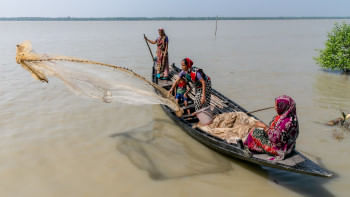Fisherwomen’s rights must be honoured

A recent study on the fishing communities has brought to light a painful reality: that fisherwomen still face deep-rooted bias and discrimination. The study has found that 90 percent of fisherwomen in Bangladesh are victims of gendered bias as their work is often disregarded as "less important" compared to men's. Experts have pointed to the patriarchal mindset that still prevails in society, including within our policymaking mechanisms, as the root cause of this situation. As such, giving all their due recognition requires a reset in the prevailing attitude.
Of the fisherwomen surveyed, as many as 83 percent have not yet received their National Fisherfolk ID cards, which are essential to access government aid programmes. Without the ID, they are excluded from social safety nets, cooperative membership, and leases on state-owned water bodies, thus limiting their chances of gaining economic independence. Also, unregistered fisherwomen cannot access low-interest loans through cooperatives, which means when they need funds, they must turn to informal lenders who charge exorbitant rates of interest, placing these women under a huge debt burden.
As experts have pointed out, there is an inherent bias against female participation in fishing labour that keeps women invisible while unjustifiably favouring male fisherfolk, even though they often perform the same work. Rather than being acknowledged as fully fledged fishers, they are labelled as mere "assistants." Lack of formal recognition also means fisherwomen's needs remain ignored in policymaking. The study has also highlighted health-related challenges that fisherwomen face due to exposure to saline water, which is worsened by the impact of climate change. Lack of proper access to clean water and hygiene products is also a cause for concern. What's worse, local clinics often dismiss women's symptoms when they try to access healthcare services.
This state of affairs must change. Giving fisherwomen their due recognition is of utmost importance if we want to see the country's fishing community rise above poverty. For that, we need a gender-sensitive social outlook as well as policymaking, where fisherwomen's labour, economic independence, health, and well-being are considered equally valuable as those of fishermen. As a first step in that direction, an easy, transparent registration process must be put in place so that fisherwomen can obtain their IDs without hassle. This should be followed by access to healthcare services and affordable credit, so they don't have to turn to informal lenders for funds. Above all, we must do away with the mindset that women's labour is less valuable than men's.


 For all latest news, follow The Daily Star's Google News channel.
For all latest news, follow The Daily Star's Google News channel. 





Comments